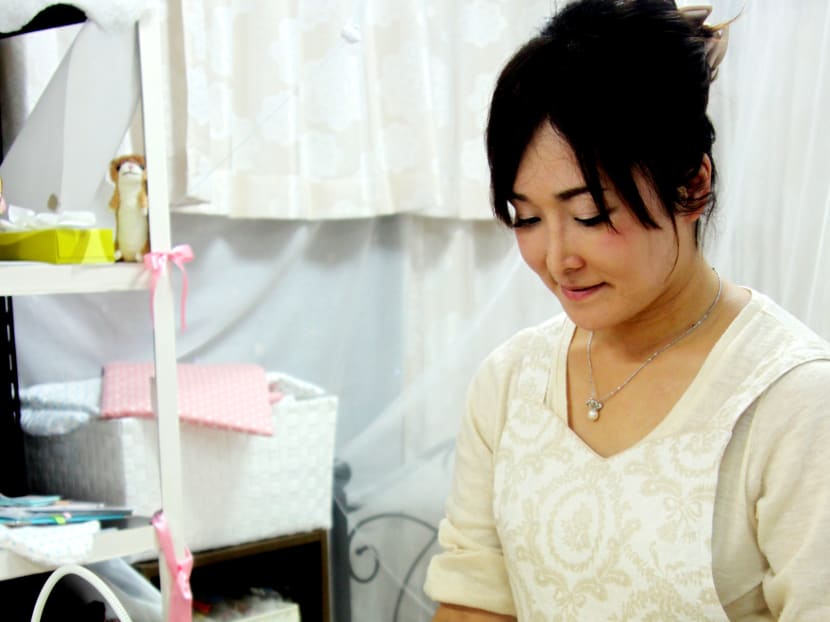Only in Japan: A hospital for stuffed toys
TOKYO — When Seiko Kita took her three-year-old to an Osaka hospital for treatment of injuries, including damage to her ears and other body parts, she never expected the service would be such a godsend.

Ms Komichi Horiguchi, head of Nuigurumi Byoin or Stuffed Toy Hospital, with a ‘patient’. The Osaka-based hospital helps to clean and repair stuffed toys that have been torn, dirtied, or have missing body parts. Photo: Kyodo
TOKYO — When Seiko Kita took her three-year-old to an Osaka hospital for treatment of injuries, including damage to her ears and other body parts, she never expected the service would be such a godsend.
But “Nuigurumi Byoin” — a self-styled hospital for stuffed toys — came to the rescue of her pink toy rabbit Pi-chan, as Ms Kita affectionately calls her “only girl”. She has another stuffed toy who is Pi-chan’s “brother”.
The hospital prides itself on having the standards of a top-level medical facility — high-quality care, skilful “doctors”, reassuring nurses, and a friendly and sanitary environment — but only treats stuffed toys.
“Nuigurumi Byoin” (Stuffed Toy Hospital), which opened in 2014 in Osaka Prefecture and only accepts patients by reservation, has become a hot topic on social media, its popularity stemming from its attention to detail.
In the six months from March to September it received some 3,200 reservations, with some placed on standby for up to three years, according to Komichi Horiguchi, head of hospital operator Cocoro.
Ms Horiguchi, 41, admits the hospital’s popularity has come as a surprise. “We did not think there was this much demand. Bookings keep coming,” she says.
So far, 800 “patients” from Japan and abroad have been admitted to the hospital, where they stay on average for two to three weeks, depending on the extent of treatment required. The patient’s condition and information are entered on a registration form.
Essentially, the hospital is a cleaning and repair service for stuffed animals or plush toys that have been torn, dirtied, or are lacking a body part. The doctors there, currently six, are experts in suturing and repairing damaged parts.
“I felt the word ‘repair’ just did not sit well, based on the close relationship between the patients and family members,” explains Ms Horiguchi. “The stuffed toys are treated as family, so it was right to welcome them in a hospital.”
Ms Kita recalled how anxious she was about Pi-chan, which is a mix of “Pinky” and “chan,” a Japanese term of endearment for girls. There were similar repair shop facilities, but she was touched by the quality of service at Nuigurumi Byoin, she says.
Pi-chan had to undergo a difficult procedure involving “suturing” and a “hair transplant”, which entails replacing deteriorating cotton. Afterwards, the originally pink-coloured rabbit, which lost some of its stuffing, was considerably lighter.
Ms Kita and her husband, both aged 52 and childless, dote on Pi-chan, who has lived with them for more than a decade and has become their “source of comfort”. They live in Nara Prefecture, an hour’s drive from the hospital in Osaka’s Toyonaka city.
The basic cost for such care — including surgery, admission, “bed” space, and nursing expenses — is around ¥3,300 (S$44.50). Other options include a travel cost of ¥600 if the patient is transported home by postal service, and a spa treatment that involves bathing and massaging them in organic detergents, as well as a CD documenting their hospital stay.
It might be more practical to buy a brand-new stuffed animal, but for the Kitas and others, the benefits outweigh the costs.
Ms Kita describes Pi-chan as a “pampered girl who gets lonely” but says “she is irreplaceable”, adding that one of the services she most appreciated was being updated about Pi-chan’s progress through a website.
Ms Horiguchi says that since no patient is alike, all of them must be treated with “delicate” care. “Failure is not accepted,” she says. The idea of treating stuffed animals as patients might sound far-fetched, but activities specifically designed for cuddly companions are not unusual in Japan.
For example, stuffed toys can be sent on vacation tours or to Yawarakan’s Cafe, a cafe exclusively for stuffed toys where they can make friends with other patrons and have photos taken.
“Stuffed toys are simple, and unlike robots cannot move. But there is something about their presence that brings out kindness in people,” says Ms Harumi Kozuka, head of the Yokohama-based Japan Nuigurumi Association, which has been organising trips for stuffed toys since 2002 in and beyond Tokyo, and as far as Boston. KYODO NEWS









